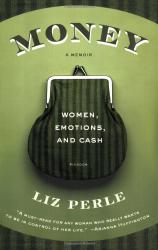Reading Group Guide
Discussion Questions
Money, A Memoir: Women, Emotions, and Cash

1. Why does it often take a reversal like what Liz Perle experienced for women to wake up and take responsibility for their finances?
2. Every woman harbors fantasies about what money will do for them. What are the most common ones? Discuss how "magical thinking" contributes to avoiding the reality of one's financial situation. Why do many people defiantly spend exactly when they shouldn't? Is there such a thing as "retail therapy"?
3. What are some of the common fears women have when it comes to money? Have any of these fears ever come true? Why are they so prevalent? Why does anxiety often persist even when one has an outward sense of security?
4. Discuss how a woman's bank balance affects her self-esteem.
5. Why do more women than men ignore money issues? Is there an actual difference in their approach that can be attributed to gender? Why do men equate money with power and women connect it to love? Is it easier for women to disconnect from money because their identities are not as tied to it?
6. Do women sometimes feel that money is immoral? Do they resent the fact that they need it? Do they resent having to take care of themselves financially? Why is money often associated with shame?
7. Many women's relationships to money are like their relationships to food. Discuss how money can make one compulsive.
8. Discuss the relationship of women's independence and their ambivalence toward it to their relationship to money.
9. Despite the progress of the last few decades, money and love are still connected to what? in the brain. How can a woman insist that money does not buy love but still want to be with a man who has a lot of it?
10. It has been found that men use money as a differentiator while women use it to form bonds and friendships. Do you agree that women tend to minimize financial disparities for the sake of harmony? How is a woman's desire to please connected to her financial security?
11. How did the baby boomers lose sight of the principles of their generation and create a class of consumers? Why do so many people spend far beyond their means? Whose fault is it that so many people are nearing retirement with no safety net? Have expectations really changed? How did we arrive at the need for luxury, not just comfort?
12. Consider the ways in which the financial lessons of our parents affect us as adults and parents. How can we resolve the quandary of living up to both a father's role of providing financial security and a mother's role of maternal protection? Is it possible to reconcile these conflicting identities by which we define ourselves in terms of money? Discuss family legacies with mixed messages. How have women tried to play both roles today and can they succeed?
13. Why don't women ask to get paid what they are worth? Are they afraid that they don't deserve it, or that it will make them appear too materialistic, or selfish? Why are they willing to sacrifice money for connection?
14. When a boy has a job -- like mowing lawns -- he's often praised as being enterprising. When a girl has one -- like babysitting -- she is often told she's good with children. What messages do these two forms of praise carry? What are the repercussions?
15. Discuss money as an aphrodisiac and as social validation.
16. Women and men often interpret making a purchase in different ways. Is keeping finances separate a way to keep a marriage together? Does money trap women in marriage? Money is often a point of contention in any relationship. How can it be neutralized as a subject? (these are huge and different questions -- you might want to separate or make them thematic. Like: Discuss money's power in a marriage. Do couples take on compensatory roles like "hoarder" and "spender"? What are the repercussions of separating finances? Does it change the balance of power in a marriage? What happens when women make more money than their mates? Or the other way around? Can money trap women in marriages?
17. Why is it easier for women to take care of money and budgets in their businesses but not in their personal lives? Is it possible to demystify money, give it less emotional weight? Is it conceivable to perceive money as a means to an end instead of merely a goal?
18. Discuss how we might communicate the limits of money to our children and the younger generation. What are some of the ways that one can be happy with what one has, rather than what one wants?
Money, A Memoir: Women, Emotions, and Cash
- Publication Date: December 12, 2006
- Genres: Nonfiction
- Paperback: 288 pages
- Publisher: Picador
- ISBN-10: 0312426275
- ISBN-13: 9780312426279







